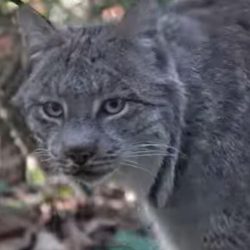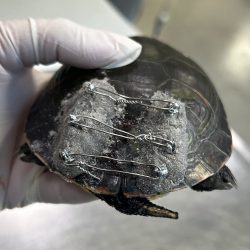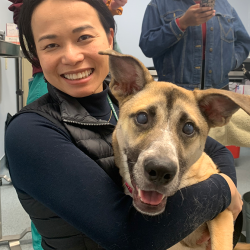The Big Babies 5K is an annual run/walk that raises funds for the medical expenses of young large animals (foals, crias, calves, kids, etc.) that require treatment at MSU’s Veterinary Medical Center.
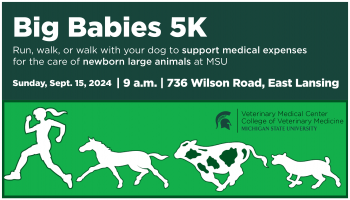
The 2024 Big Babies 5K takes place Sept. 15.
Medical expenses for newborn animals are generally unanticipated and can be substantial. The Big Babies Fund covers part of the medical expenses for clients in need, and are also used to support the training students and residents who will become veterinarians and specialists who can help these big babies. The fund was established in memory of Dr. Annie Kullmann, a Spartan large animal resident, dedicated clinician, and avid triathlete.
Meet real-life fund recipients below. Each of these young animals and their families benefitted from funds raised by race participants and donors.
Indie: The Orphan Filly
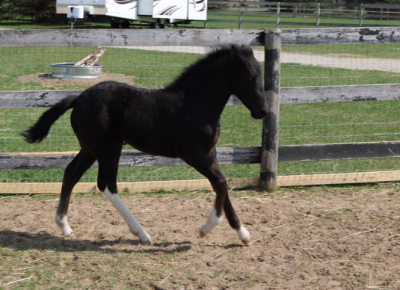
Indie visited the MSU Veterinary Medical Center at two days of age after losing her mother to post-foaling complications. The little filly was left with no mother, and no milk supply. Furthermore—Indie was a surprise to her barn, as her owner had acquired the mother horse not knowing she was pregnant!
Indie's entire barn team pitched in around the clock to provide milk replacer, but she simply refused to drink the non-mom's-milk-tasting drink from a bucket. Fortunately, the barn manager knew the risks of aspiration pneumonia when trying to use bottles, so instead of resorting to a dangerous tactic, brought Indie to MSU for help.
On arrival, Indie was quiet and dehydrated, but had received enough colostrum (the antibody-rich early milk her mother was able to give her upon birth) to avoid a plasma transfusion or antibiotics. A feeding tube administered a mixture of goat's milk and milk replacer to Indie every two hours, and she was stronger just a day later. Hospital staff worked to teach her how to drink from a bucket, and after a few days of persistence, Indie was a master of bucket-drinking. The feeding tube was removed, and she stayed at the Hospital a few more days so that staff could monitor her weight gain.
Tito: Blood Sugar Baby Goat
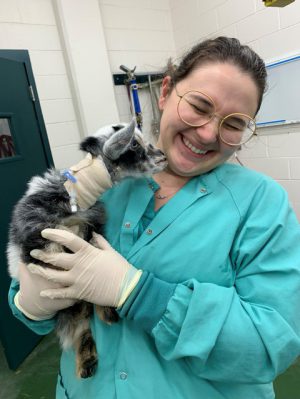
Tito, a 6-week-old Nigerian Dwarf kid, came to MSU’s Veterinary Medical Center for an inability to rise and abnormal behavior. Tito was in the process of being transitioned from a diet of only milk to a diet of hay. In the few days before he came to the Hospital, the owner noticed that Tito did not have a great appetite for the hay and probably was not eating enough to sustain himself. When he arrived, Tito could not stand on his own and appeared to be blind. He had trouble holding his head up and would vocalize loudly when touched.
Hospital staff found that Tito's blood sugar was dangerously low. He was given sugar supplementation orally and intravenously. Within 30 minutes, Tito began to perk up and could stand and walk on his own. His attitude continued to improve throughout the day, but he was having trouble maintaining a healthy blood sugar level. His feeding plan was adjusted, and Tito was eventually able to keep his blood sugar levels up without additional supplementation. Soon after, he was a bright, happy baby goat who could recover comfortably at home.
Galvin: The Clydesdale Foal
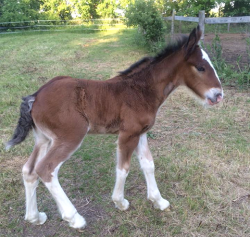
Galvin, born on a fine spring day, was unable to nurse or stand very long postpartum. The MSU Veterinary Medical Center treated him for failure of passive transfer/lack of adequate colostrum, possible sepsis or severe infection, and neonatal encephalitis. He made a full recovery.
However, after a month, Galvin returned to MSU for emergency surgery. He had developed an incarcerating scrotal hernia, and needed surgery to save his life. Thanks to the Big Babies Fund, Galvin's family received financial aid for this critical lifesaving treatment. Two years later, Galvin was fully recovered and huge, as a Clydesdale should be!
JR: A Rough-Start Cria

One early fall morning, JR's owners were surprised by a newborn cria in the stall of their alpaca, Glory. They had only recently realized that the newly-acquired Glory was pregnant. It only took a few hours to realize the new baby, JR, needed some help. He was unable to stand, and disinterested in nursing. The owners loaded both animals into the car, and headed to MSU for emergency evaluation.
At presentation, JR was weak and could not stand. Because he had not nursed, his blood sugar was likely very low. In addition, he was at high risk of generalized infection, termed neonatal septicemia, because along with potent nutrition, the first milk (colostrum) also contains antibodies that help prevent newborns from developing infections. Immediately, an IV catheter was placed and a dose of dextrose (sugar) was administered along with antibiotics to combat possible infection.
At the same time others members of the MSU team were taking care of Glory and milking her. After a feeding tube was passed through JR’s nose to his stomach, he was initially fed Glory’s colostrum followed by her milk every 2 hours around the clock for the next couple of days. Slowly, JR became stronger and developed a good suckle response. He learned to nurse from Glory on his own and, fortunately, he escaped developing a serious infection. Glory and JR were soon able to recover at home together.
Wonder Bread: An Unexpected Surprise
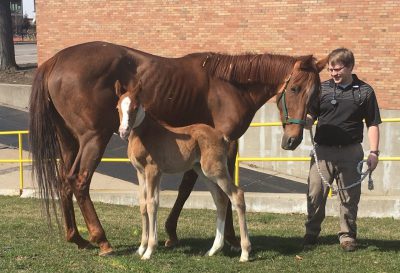
Just a day old, Wonder Bread was brought to MSU because he was weak and not nursing well. His referring veterinarian realized he suffered from perinatal asphyxia (dummy foal) syndrome and partial failure of passive transfer of antibodies, meaning he hasn't received sufficient antibodies from his mare's nutrient-dense colostrum. He would need round-the-clock supportive care.
The dam, Sunbeam Bread, was a Thoroughbred mare who had been rescued only a few weeks prior. Her caretakers had only just realized she was pregnant, and the unexpected colt arrived shortly thereafter. The somewhat thin maiden mare had only a limited amount of milk.
After a four-day stay of intensive care at the Hospital, Wonder Bread learned to nurse on his own and gained weight daily.

